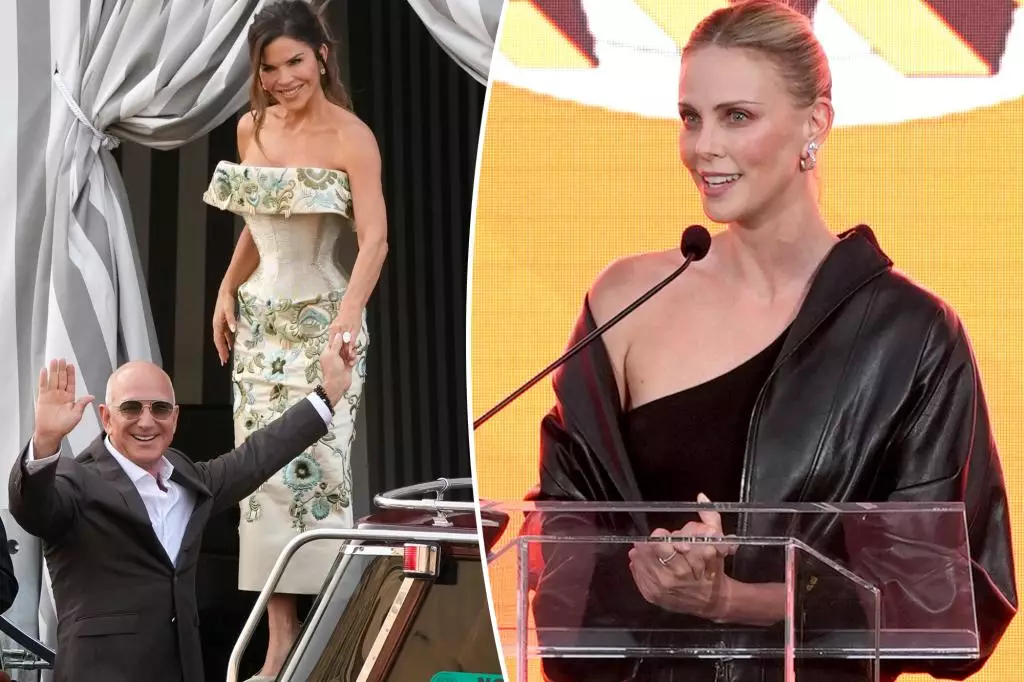When Jeff Bezos and Lauren Sánchez celebrated their lavish $50 million wedding in Venice, it wasn’t just the grandeur of the event that captured global attention—it also ignited unease and criticism. Amid the star-studded guest list, which included heavyweights like the Kardashians, Oprah Winfrey, and Leonardo DiCaprio, there existed a quiet but potent undercurrent of dissent. The conspicuous display of wealth in a city grappling with housing crises, depopulation, and socio-economic challenges felt jarring to many, raising pressing questions about the responsibilities of the ultra-rich in today’s fractured society.
Charlize Theron’s Candid Reproach
Contrasting sharply with the opulence in Venice, actress and activist Charlize Theron publicly expressed her disdain for Bezos’ over-the-top nuptials during her charity event in Los Angeles. Her remarks were laced with sarcasm and sharp criticism—she took a stand not just on the snub of not being invited, but on what she perceives as a glaring disconnect between Bezos’ extravagance and the harsh realities faced by marginalized communities. Theron’s words, “because they suck and we’re cool,” while humorously delivered, underscored a deeper frustration about the inequalities that such displays of wealth can symbolize. For Theron, these celebrations aren’t just personal milestones for billionaires—they are emblematic of a broader societal failure where systemic issues like immigration struggles, the erosion of women’s rights, and rising violence get sidelined in favor of spectacle.
The Broader Socio-Political Context
Theron’s critique resonates amid a worsening global backdrop where many feel society is regressing—particularly in human rights and social equity arenas. The contrast between Bezos’ multi-day extravaganza and the current state of political and human rights turmoil illustrates a profound tension: while the privileged revel in luxury, many face shrinking freedoms and increasing vulnerabilities. This dichotomy isn’t lost on activists or ordinary citizens, especially given the ongoing debates about wealth inequality and corporate accountability. Bezos’ continued persona as a behemoth of capitalism, further amplified by events like this wedding, often sparks dialogue about how extreme wealth is leveraged—or not leveraged—for societal good.
Local Resistance and Environmental Concerns
Venice itself became a battleground symbol during the festivities. Protesters vocally opposed the billionaire’s wedding, demanding higher taxes and condemning what they viewed as the commodification of their historic city. Greenpeace’s banner in St. Mark’s Square, calling on Bezos to “pay more tax,” bluntly spotlighted the intersection of economic power and environmental responsibility. The criticism wasn’t just about a luxurious wedding; it was a pointed indictment of Bezos’ corporate practices, including accusations of low wages and tax avoidance. Local groups further highlighted the city’s struggles with rising costs of living and the erosion of cultural integrity under the weight of tourism and commercialization. Their pushback encapsulates growing global discontent with how cities and communities are exploited for the benefit of wealthy outsiders, often at the expense of their own residents’ well-being.
Philanthropy vs. Public Perception
Acknowledging the backlash, it’s worth noting that Bezos and Sánchez did quietly contribute to local charities in Venice months prior to their wedding. Yet, this philanthropic gesture did little to quell the storm of criticism. It reveals a crucial point about modern philanthropy and public perception: monetary donations, while valuable, do not automatically translate to social license or absolution from criticism. The optics of such an opulent event in a time of acute socio-economic challenges can overwhelm positive actions, suggesting that meaningful engagement requires more than financial handouts—it demands empathy, transparency, and systemic responsibility.
What This Tells Us About Wealth and Society
The uproar surrounding Bezos’ wedding extends beyond a star-studded celebration. It forces us to confront the uncomfortable realities of wealth disparity, the performative nature of philanthropy, and the societal costs of concentrated economic power. Charlize Theron’s vocal disapproval—while humorous and biting—mirrors a growing impatience among the public and some cultural leaders who demand more accountability from those at the apex of wealth. The spectacle of billionaires’ personal lives becomes a canvas onto which broader frustrations about justice, equity, and environmental stewardship are projected. This event exemplifies the friction between personal privilege and public responsibility in the 21st century, challenging all of us to rethink how wealth should be wielded in a world facing urgent and complex crises.

